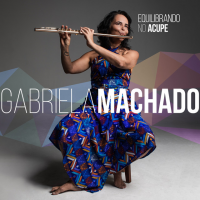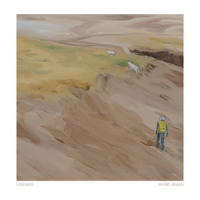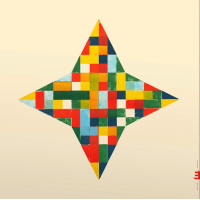Home » Jazz Articles » Album Review » Gabriela Machado: Equilibrando no Acupe
Gabriela Machado: Equilibrando no Acupe
Gabriela Machado lives in Salvador da Bahia, where she is completing a PhD in Music Education at the Federal University and teaching choro performance practices and rhythmic styles to music students. Born in the São Paulo area, she remained there until 2022, establishing a solid profile as a performer, session musician, orchestral player and choro scholar. She divides her time between the two cities, a balancing act she reflects in the title of her debut as a composer-band leader, Equilibrando no Acupe (Balancing in Acupe, her Salvador neighborhood).
Equilibrando no Acupe is a mainstream choro project, but with a contemporary flavor. Straight up, we hear the exhilarating timbre of Celso Benedito's French horn, a novel feature. The Pixinguinha-inspired choro counterpoint is there in Emiliano Castro's wonderfully fluid baixeria, and Machado covers the sub-genre bases by including choro sambada/gafieira ("Equilibrando no Acupe"), maxixe ("Filho do Tango, Maxixe É?" and "Salada de Maxixe"), waltz ("Valsinha pra Você"), polca ("Segura a Polca"), baião ("Baiãozinho Sertanejo"), frevo ("Passistiné") and samba ("Pras Mestras") in the mix.
Machado's melodies, structures and rhythmic feels belong to the choro classico nexus, but she bakes opportunities for soloistic improvisation into the compositions, making them subtly jazzier. In this respect, she aligns with jazz-informed Brazilian chorões like 7-string guitarist Douglas Lora (who works with Anat Cohen, Trio Brasileiro and other groups) and flutist-saxophonist Edu Neves (on recordings like Stephen Guerra's No Balanço do Choro-Samba and elsewhere). Add to that list pianists like Amilton Godoy and Adolfo on the Brazilian jazz/música instrumental brasileira side and, in the North American jazz stream, pianists Cliff Korman and Renee Rosnes, drummer Alex Kautz, Hamilton de Holanda and Gonzalo Rubalcaba, among others.
This is not your grandmother's choro, strictly speaking, but composer Chiquinha Gonzaga would recognize it as choro, even without the little bread-crumb quotes Machado provides. Yet a 21st-century aficionado might perceive a touch of jazz in her arrangements, in Nailor Proveta Azevedo's clarinet, Debora Gurgel's piano, Douglas Alonso and Guegué Medeiros' drums, even Matheus Kleber's accordion. And cavaquinista Camila Silva's work adds resonance to the ensemble's sonic acknowledgment of the idiom's African and indigenous roots.
"Pras Mestras" is at the heart of the project, as a "valorization and gratitude to my female references." Machado dedicates the album to the many women who have inspired her. In conversation with AAJ, she expressed her pleasure at having been able to bring three generations of feminine masters together for the recording: Gurgel, the eldest; Silva, the youngest; Machado in the middle. Over the years, many of her teachers have been women, and she has worked with many women musicians, including the group Choronas, which she founded in 1994 with cavaquinista Ana Cláudia César, guitarist Paola Picherzky and percussionist Roseli Câmara.
There is still work to be done to achieve parity for women in the discipline, she says, but she speaks of "a movement" in Brazil, where women support each other as composers, performers and teachers. She is happy to describe it as a kind of "affirmative action," a corrective that opens the field and, as Equilibrando no Acupe attests, enriches the aesthetic.
Track Listing
Equilibrando no Acupe; Filho de Tango, Maxixe É?; Espinhaço; Valsinha pra Você; Salada de Maxixe; Choro Não É Fake; Segura a Polca; Baiãozinho Sertanejo; Pras Mestras; Tutu; Serelepes; Passistiné.
Personnel
Gabriela Machado
fluteMatheus Kleber
accordionEmiliano Castro
guitarDouglas Alonso
drumsDebora Gurgel
pianoNailor Proveta
clarinetCelso Benedito
french hornGuegué Medeiros
percussionAdditional Instrumentation
Camila Silva: cavaquinho.
Album information
Title: Equilibrando no Acupe | Year Released: 2024 | Record Label: Self Produced
Tags
PREVIOUS / NEXT
Support All About Jazz
 All About Jazz has been a pillar of jazz since 1995, championing it as an art form and, more importantly, supporting the musicians who make it. Our enduring commitment has made "AAJ" one of the most culturally important websites of its kind, read by hundreds of thousands of fans, musicians and industry figures every month.
All About Jazz has been a pillar of jazz since 1995, championing it as an art form and, more importantly, supporting the musicians who make it. Our enduring commitment has made "AAJ" one of the most culturally important websites of its kind, read by hundreds of thousands of fans, musicians and industry figures every month.



















